- Home
- Sidney Sheldon
The Phoenix Page 12
The Phoenix Read online
Page 12
‘Really?’ said Ella, intrigued by this small, humanizing detail. Both of her parents had become shadowy figures, but now her mother felt even more opaque than her father. He at least had written letters and cards, leaving something tangible for Ella now that she had got her hands on them. The place where her mother’s memory should be was just an empty space, with nothing more than snatched fragments of remembered words, touches and smells, and even those were fading as each year passed.
‘Their missions were classified,’ Gabriel went on, ‘so I can’t talk about them.’
‘Only the government can classify things,’ said Ella, annoyed. ‘Do you even realize how self-important you sound?’
‘They died in 2001,’ Gabriel said, ignoring Ella’s outburst.
‘You mean they were murdered,’ said Ella. ‘That’s what you told me before.’
‘Yes,’ said Gabriel.
‘You also said you’d tell me how they were killed. Once I started training,’ Ella reminded him.
‘I believe I said, I would tell you when the time was right. When you were ready.’
‘And when will that be?’ Ella raised her voice furiously. ‘In your high-and-mighty opinion?’
‘When you leave for your mission,’ said Gabriel, finishing the last of his wine and refolding his napkin, placing it neatly on the table.
‘Enough,’ said Ella, too tired to have the same argument with him again. ‘I’d like you to take me home now, please. Like you promised. To San Francisco.’
‘OK,’ said Gabriel calmly. ‘If that’s what you want.’
‘It is.’
He nodded. ‘We’ll go now.’
They walked in silence back to the car. Opening the door for Ella in an uncharacteristically chivalrous display, he waited for her to buckle up before getting behind the wheel and starting the engine.
‘Dix will be sad you didn’t say goodbye,’ he observed as they headed back along the narrow lane towards the main road.
‘I’ll miss him,’ said Ella. ‘He’s a good man. Please tell him I’ll keep practicing the techniques he taught me, and that I’m very grateful for everything he did.’ Wistfully, she pulled the earpieces the professor had given her the day they met out of her pocketbook and laid them on her lap. ‘At least I’ll still have these to remember him by.’
‘I’m afraid not,’ said Gabriel, holding out his hand. ‘We’re going to need those back.’
‘What? No,’ said Ella, snatching the earpieces away. ‘These are mine. Dix gave them to me.’
‘While you were working with us,’ said Gabriel. ‘Anything conceived and/or manufactured in our labs is proprietary technology. You must return them.’
‘And what if I don’t?’ said Ella. She was growing heartily sick of Gabriel’s musts. ‘What are you going to do about it? Call the police? Report me for theft?’
‘No.’
‘No,’ she mocked him. ‘Of course you aren’t! Because you know as well as I do that the authorities will be a sight more interested in what you and your friends are doing up in those forests. Brainwashing people and half starving them and having them sign their lives away to a cult that sends them off to commit crimes and get murdered and calls that “justice”.’
With a scream of brakes and a terrifying spray of gravel, Gabriel brought the car to a halt. Turning off the engine he turned on Ella in white-lipped fury.
‘Is that really what you think? That we’re a cult? After all this time, after all that’s been done for you and shown to you and shared with you?’
Ella wanted to shout back that she hadn’t asked for anything to be ‘done for’ her. That all she wanted was to be left alone, to grieve for her family and get on with her life as best she could, in peace. But something about his face, his hurt, angry, ridiculously attractive face, held her back.
‘Do you think Professor Dixon is the kind of man you can brainwash?’ he demanded.
Ella had to admit that she didn’t. ‘But Dix is an exception.’
‘No!’ Gabriel roared. ‘Not an exception. Exceptional, yes. Brilliant. Committed. Honorable. Brave. But then so are all of our operatives, in their different ways. Michael Dixon had a life and a career back in England, Ella. He had endless opportunities to make money and an academic name for himself. But instead he chose to sacrifice those things for a greater good. He devoted his gifts to the good of others, to the betterment of mankind, to something bigger than himself.’
‘So you keep saying,’ Ella shot back, taking comfort in her own cloak of righteous indignation. ‘But what “greater good” are you talking about? You never explain it. You never explain anything, not really. Instead you ask me to put my life on the line for a “cause” without a name. Why should I, Gabriel? Why should I?’
Gabriel looked away for a moment. He was under direct orders not to divulge anything to Ella until the mission was underway. Until she was in the air, en route to the target, committed. Until it was too late for her to turn back. Gabriel had gone along with it up till now, but it had felt wrong from the beginning. Her question was a good one. Why should she go, based on nothing but trust and platitudes? She deserved an explanation. Not the whole truth perhaps. But she deserved something.
‘Everybody joins The Group, and takes these risks, for their own reasons,’ he began. ‘In my case it was a woman.’
‘Why am I not surprised?’ said Ella, but the look on his face told her instantly this was not a time for quips.
‘When I was in college, I took an internship with a technology firm in India. I spent six months in Bangalore,’ said Gabriel. ‘I became close friends with a young woman there. Her name was Mira. Mira Saluja.’
Ella listened intently.
‘Mira was five years older than me. Brilliant, very beautiful, from an educated Punjabi family. We dated for a few months but her parents didn’t approve. They had already decided on a husband for Mira. I think maybe she would have gone against them and stuck with me if I’d made a commitment to her,’ he mused. ‘If I’d proposed marriage. But I didn’t. She thought I wasn’t serious about her.’
‘Was she right?’ asked Ella.
Gabriel looked pained. ‘No! I loved her. She was perfect. But I’m not the marrying kind.’
Ella nodded understandingly. ‘Me neither.’
‘In any case it didn’t matter in the end because, six weeks before my internship was up, Mira was brutally raped and murdered.’
He said it so matter-of-factly, Ella was shocked. ‘By whom? The Indian husband? Or his family?’
Gabriel shook his head grimly. ‘No. Although a lot of influential people devoted a lot of time and effort to trying to frame it as an honor killing. But no. Sanjit, Mira’s fiancé, was a good guy. No, Mira was killed by a senior American diplomat by the name of Scooter Ryan. You might have heard of him.’
Ella blanched. She wasn’t into politics and rarely read the papers or turned on the TV news. But even she had heard of Scooter Ryan – devoted patriot, family man and father of three, killed by a car bomb outside Boston in one of the only unsolved, unclaimed terrorist attacks to take place on US soil in the last decade.
‘The Scooter Ryan? The republican, family-values guy?’
Gabriel nodded. ‘Yup. Also a rapist and a killer and a liar.’
‘Wasn’t he an ex-marine?’ Ella asked, as the Boston car-bomb story came back to her.
‘That’s right,’ said Gabriel. ‘Scooter came on to Mira one night at a hotel bar, close to the US consulate. She wasn’t interested. After Mira turned him down, he followed her, beat her, raped her, and finally strangled her with her own scarf. Then he dumped her body on a trash heap fifteen miles north of the city and kept going to his country retreat, where he spent the weekend playing polo with a bunch of visiting State Department families.’
‘He wasn’t arrested?’
Gabriel stared down at his lap. ‘No, he was not.’ He said the words slowly, as if he’d been taught them by a therapist whose job it was t
o keep him calm. ‘Because that’s not how it works, apparently, not in the “real world”. Rumors were denied, evidence suppressed, money changed hands, and diplomatic immunity was invoked. Mira was buried, the press fell silent, and Scooter went home to the States, with no more fuss than if he’d accidentally killed a stray pheasant on the road.’ Looking up, his eyes bore into Ella’s. ‘So I was angry about that.’
The understatement hung in the air between them like a charge of lightning.
‘A few weeks later I found The Group. Or maybe they found me, I’m not sure exactly how it went down. I was drinking a lot. But that’s what The Group do, you see. When the powers of the “real world” let you down; when they take the side of the powerful, no matter whether those people are good or bad, right or wrong, The Group steps in to make sure that justice prevails.’
After a silence that felt like forever, Ella asked him flat out. ‘Are you telling me that you – that The Group – murdered Scooter Ryan?’
For the first time since he began the story, Gabriel smiled. ‘I don’t believe I told you that. I’m simply explaining what happened to my friend Mira, and how it led me to this life. I’m telling you that Mira was my emotional hook. Because you want to know what yours is. Why you should join a group you know next to nothing about.’
‘Did you kill Ryan?’ Ella asked again. She wasn’t about to be deflected that easily.
Gabriel’s returned her gaze. ‘Sometimes, usually, doing the right thing means saving lives. Sometimes it means exposing what’s been hidden, or hiding what others would like to expose. Sometimes it means breaking the law in pursuit of a greater good. And occasionally – yes – it means killing people. Bad people. The world is full of Scooter Ryans. Of people who believe they are above the law. From drug lords, heads of state and CEOs, right down to lowly people-smugglers, pedophile priests and corrupt prison officers. The Group isn’t Greenpeace, Ella. But we aren’t a cult either. We are a secret, elite, moral force. To be invited to join us is both a privilege and a responsibility. How you choose to respond to that call will be your free choice.’
‘So you did kill Ryan.’
He suppressed a smile. ‘If you say so, Ella. All I’m saying is that whatever I did, I did for Mira. And I believe that whatever you do, should you choose to join us, you’ll do for your parents. They’re your hook. So if you’re looking for a reason to go on this mission, how about avenging their murders?’
Ella stiffened. He had her attention now.
‘The mission has something to do with my parents?’
‘It does.’ Gabriel nodded. ‘I can’t tell you more than that. I shouldn’t even have told you that. But yes. It does.’
Restarting the engine, he set off again. A few minutes later they reached the T-junction with the main road.
‘San Francisco’s that way.’ Gabriel nodded to the right. ‘And Camp Hope’s to our left. Your choice.’
My choice, thought Ella. In one direction lay danger, uncertainty, and being forced to place her trust in a group that told her next to nothing, while expecting her to blindly obey its orders. In the other lay safety, calm, and at least the possibility of a normal life.
But I wouldn’t have avenged my parents’ murders.
I wouldn’t have righted the wrongs of the past.
I would have to live the rest of my life never knowing what might have been. Wordlessly, Ella pointed left. The decision was already made and they both knew it.
She couldn’t back out now.
They drove the rest of the journey in silence. At the usual parking place in the woods, where the hiking trail began, a young man Ella vaguely recognized from around camp was waiting to meet them. Gabriel waved a greeting from the car but showed no sign of getting out.
‘You’re not coming?’ Ella asked.
He shook his head. ‘No. I have to get back to my own assignment. But I’ll be in touch. Good luck.’ Lowering his voice, he added, ‘And don’t tell anyone what I told you.’
‘When will they tell me more? About this mission?’ she asked, suddenly panicked about the idea of Gabriel leaving. She couldn’t say why exactly, but for all his arrogance and abrasiveness, he was a link to reality, to the outside world and her old life. A way back. Like him or loathe him, Gabriel was Ella’s lifeboat. She didn’t want to have to watch him sail away.
‘You knew about Scooter, about what he’d done,’ Ella reminded him. ‘You told me that you found The Group. That you sought out your revenge. It’s not like that for me. I still don’t know anything about this mission. I don’t know who killed my parents, or why, or where they’re sending me. I mean, obviously there’s a Greek connection or Dix wouldn’t have made me take the Babbel classes, but other than that …’
‘Ella.’ Gabriel rested a hand briefly on her arm. ‘Let it go. Commit to The Group. They’ll tell you more when it’s safe to do so. But they won’t be rushed. My guess is that you won’t be fully briefed till you’re on the plane.’
Ella rolled her eyes. ‘If this turns out to be some wild-goose chase, I’m holding you responsible.’ Opening the passenger door, she jabbed a defeated finger in Gabriel’s direction. Without thinking he reached out and caught it, their hands suddenly entwined.
‘Don’t rely on me, Ella,’ he said gruffly, his voice catching in his throat. ‘Don’t rely on anyone. Only on yourself.’
‘Fine,’ said Ella, her own throat dry and hoarse all of a sudden. She climbed out of the car, straightening the creased skirt of her sundress. ‘I won’t.’
‘Goodbye,’ said Gabriel, starting the engine.
That’s it? ‘Goodbye?’
Ella studied his face, but his expression had switched back to neutral, as unreadable as a Sanskrit tablet.
With a sinking heart, she watched him drive away.
For better or worse, her new life was about to begin.
PART TWO
CHAPTER NINE
‘Mood! Mahmoud!’
The fat policeman, Thalakis, clapped his hairy, sausage-like hands in front of the prisoner’s face. It was stiflingly hot in the cell. Not the dry, desert heat of Libya, where Mahmoud ‘Mood’ Salim grew up in a sleepy village sixty miles from Murzuk. This was the stinking, fetid, heavy heat of Greece, a country Mood had already come to hate with every fiber of his being. The air here smelled of sweat and fish and cheese and lies, of the stinking breath of men like Inspector Thalakis. Not men. Beasts. Animals, devoid of compassion.
‘Speak, man!’ Flecks of spittle flew off the policeman’s swollen lips and landed on the prisoner’s skin. ‘Answer the question,’ Thalakis commanded. ‘Answer, or it will be worse for you!’
Worse for me. In other circumstances, in his old life, Mood would have laughed. How did this ignorant pig of a man imagine that anything could possibly be worse for him than it was now?
‘Who did you pay for your passage? Tell me!’ The sausage fist slammed down on the cheap Formica table. ‘Who brought you here, Mahmoud? Your family …’
It happened before anyone knew what was happening. The prisoner rose up out of his chair with a primal roar, like a monster from the depths of the Aegean, and lunged at Inspector Thalakis, wrapping his powerful, giant’s hands around the fat man’s neck.
‘Don’t you speak of my family!’
The giant hands tightened. Thalakis’s face turned red, then purple, his eyes bulging out of their sockets like grapes about to burst their skin. The two guards present threw themselves at the prisoner, Mood, pulling him back with all their combined strength, but to no avail. It was like trying to pry a barnacle off the keel of a boat with a plastic spoon.
He’s going to kill him!
Thalakis was losing consciousness. In panic, one of the guards pulled out his pistol. Turning it over, he brought it down hard, handle-side, on the back of the prisoner’s skull. There was a loud crack, then blood, then silence. Like a felled tree, Mahmoud Salim slid to the ground. Inspector Thalakis fell forward onto the table, gasping for air like
a dying fish.
The last thing Mood remembered, before the blackness engulfed him, was the cold swell of the final wave. That, and the sound of his six-year-old daughter’s screams as she was swept away …
Mood Salim had been born into a large family of goat herders in Libya’s southwestern Fezzan region. The youngest of six sons, his childhood had been Spartan but happy. There were no toys or televisions or other modern-day luxuries. The Salims lived as countless generations had before them, and about as far removed from the politics of Tripoli and the world beyond as it was possible to be. Mood’s playmates were his brothers and cousins, and the endless Saharan ergs or sand dunes had been his playground. His mother was his teacher, his father his god, and his goats his purpose. He never knew hunger, and would not have considered himself poor, not having experienced any other way of living.
That Libya was gone now, the stuff of storybooks for Mood’s own children. He and his wife Hoda had been blessed with two daughters. Parzheen, the older girl, was black haired and dark eyed and as quick-witted and cunning as a little sprite. Her younger sister Ava was softer, rounder, sweeter, with a laugh that sounded to Mood like water bubbling up from a desert spring.
‘Her laugh is like life, like a gift from heaven,’ he used to say to Hoda, watching the tiny toddler crawl around in their cramped apartment in Tarhuna. Hoda would smile and kiss him. She adored her husband’s romantic streak, the poetry in Mood’s soul that she felt sure must have come from his upbringing out in the desert. Her own childhood had been the polar opposite: educated, middle class, urban, and not particularly happy. Her parents divorced when she was eleven, leaving Hoda and her brother Khalil to fend mostly for themselves.
Everybody commented on how the Salims were a marriage of opposites, a classic case of the old and new Libya colliding, although nobody could question the success of the union. Mood, as broad and strong as an ox, six foot five in his bare feet and tiny, elfin Hoda were utterly devoted to each other and their children. Their modest flat in Tarhuna had positively buzzed with happiness.

 Windmills of the Gods
Windmills of the Gods After the Darkness
After the Darkness The Best Laid Plans
The Best Laid Plans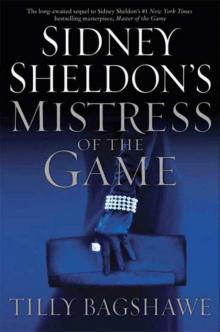 Mistress of the Game
Mistress of the Game Tell Me Your Dreams
Tell Me Your Dreams Master of the Game
Master of the Game Memories of Midnight
Memories of Midnight Are You Afraid of the Dark?
Are You Afraid of the Dark? Nothing Lasts Forever
Nothing Lasts Forever Rage of Angels
Rage of Angels The Sky Is Falling
The Sky Is Falling The Sands of Time
The Sands of Time Morning, Noon and Night
Morning, Noon and Night The Doomsday Conspiracy
The Doomsday Conspiracy The Naked Face
The Naked Face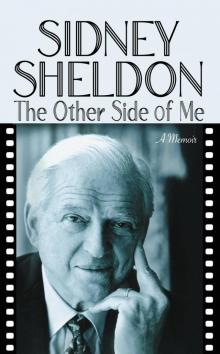 The Other Side of Me
The Other Side of Me Bloodline
Bloodline The Stars Shine Down
The Stars Shine Down The Other Side of Midnight
The Other Side of Midnight A Stranger in the Mirror
A Stranger in the Mirror Sidney Sheldon's Angel of the Dark
Sidney Sheldon's Angel of the Dark Sidney Sheldon's the Tides of Memory
Sidney Sheldon's the Tides of Memory The Phoenix
The Phoenix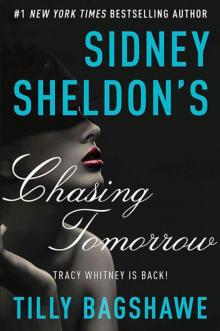 Sidney Sheldon's Chasing Tomorrow (Tracy Whitney)
Sidney Sheldon's Chasing Tomorrow (Tracy Whitney)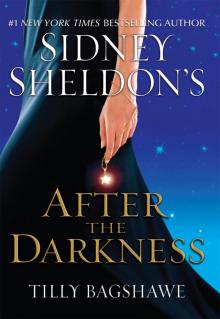 Sidney Sheldon's After the Darkness
Sidney Sheldon's After the Darkness Sidney Sheldon's Reckless
Sidney Sheldon's Reckless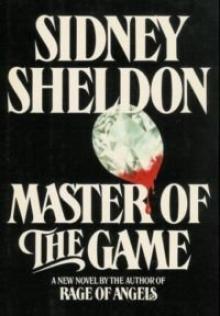 Master of the Game motg-1
Master of the Game motg-1 Sidney Sheldon's the Silent Widow
Sidney Sheldon's the Silent Widow Morning, Noon & Night
Morning, Noon & Night